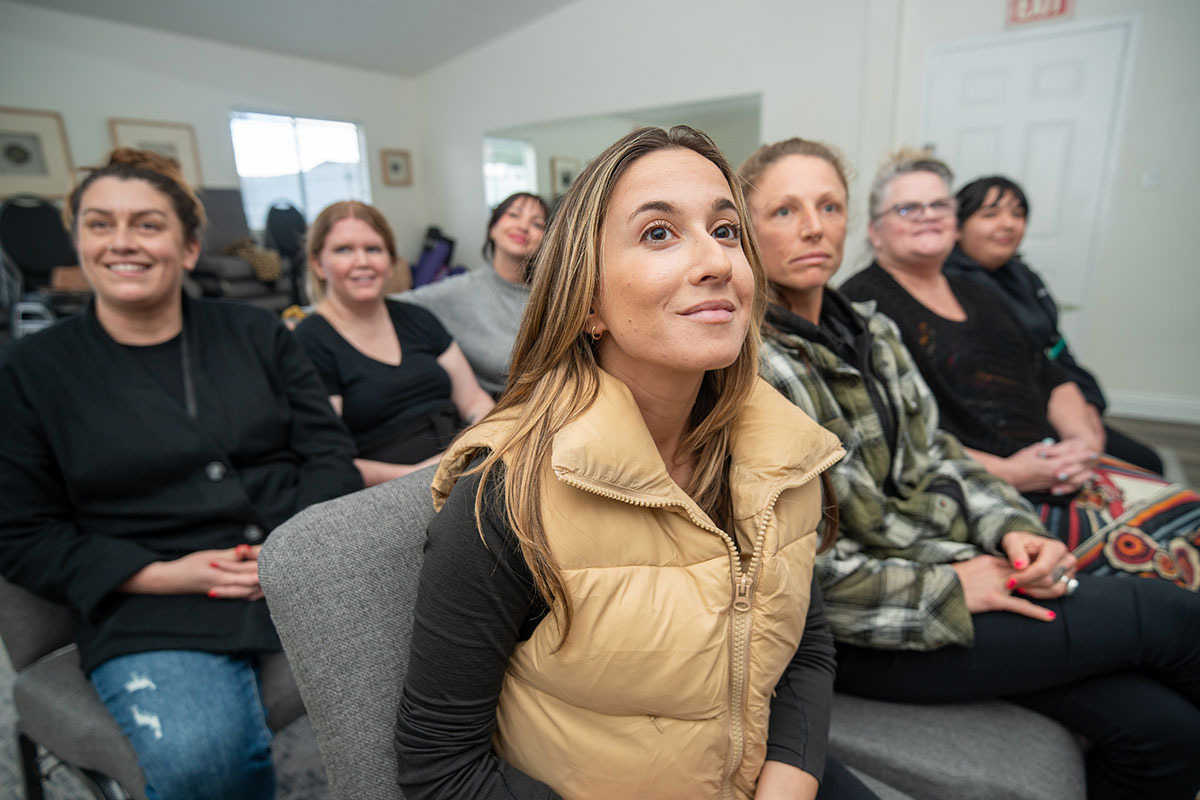Valium is a drug that is part of the benzodiazepine group. It is known to produce calming effects. It is the second-most commonly prescribed benzo and produces longer-lasting effects than most other benzos do.
Like many other benzos, Valium is very powerful. Therefore, there is a great risk of a Valium addiction developing, even if individuals use it as medically directed. In fact, even if the drug is prescribed by a doctor, taking Valium for longer than 4-6 weeks significantly increases the chances of a Valium abuse or addiction issue.
It is important to learn more about Valium, the risks associated with taking it, and signs that a person might be suffering from an addiction to it. If you are a woman who is currently dealing with Valium abuse, New Directions for Women can help you.
What is Valium?
 Valium is a powerful benzo that is often prescribed to treat muscle spasms, anxiety, insomnia, and in some cases even seizures. In some cases, valium is used to help those struggling with the symptoms of alcohol withdrawal as well, usually while detoxing. Valium works by calming the brain down and diminishing hyperactive brain function. This allows the user to feel some relief, whether it be from stress, anxiety, or muscle pain.
Valium is a powerful benzo that is often prescribed to treat muscle spasms, anxiety, insomnia, and in some cases even seizures. In some cases, valium is used to help those struggling with the symptoms of alcohol withdrawal as well, usually while detoxing. Valium works by calming the brain down and diminishing hyperactive brain function. This allows the user to feel some relief, whether it be from stress, anxiety, or muscle pain.
Typically, people take Valium orally in pill form. Based on the prescription, Valium can be taken anywhere from 1-4 times a day. While this drug is designed to be taken regularly to be effective, that can come with some added risks. Regular and prolonged use of Valium, especially when taken in ways other than directed, can lead to abuse and even addiction. Even when it is taken as directed and with a prescription from a doctor, there is still a risk that a dependency will develop.
How Can a Valium Addiction Develop?
While Valium is often prescribed to help people get through their day better by helping to relieve their anxiety or help them get to sleep at night, it is those same people who are also likely to abuse it and get hooked on it. In fact, most people who abuse and ultimately get addicted to Valium don’t take it to get high like many other substances of abuse. They take it to get through their day better and once they realize how good they feel and how much easier their day is, they continue to take more and more. The more Valium is taken the greater the chances of a dependency developing. This dependency can ultimately lead to addiction.
Another common reason people abuse Valium is to help them get to sleep. This drug can produce intense calming effects, helping them get to sleep at night. While that might seem great at the time, eventually the brain may become so dependent on Valium that it will be unable to function properly without it.
What Are Some Signs of Valium Addiction?
Since Valium is a legal prescription drug, some people might think that there are no real risks. Especially compared to “street drugs” like cocaine or heroin. That is not the case though. Just like any other substance that can be abused, taking Valium, especially for extended periods of time can still lead to addiction.
Since Valium isn’t a street drug, it might be tougher to spot someone who could be struggling with Valium dependency or addiction. After all, they likely have obtained it legally from a doctor and might not even be taking more of it than they should. As a result, some of the more common signs of addiction might not be present.
 If you think that someone you know is struggling with Valium use, here are some potential warning signs to look out for:
If you think that someone you know is struggling with Valium use, here are some potential warning signs to look out for:
- Slurred speech
- Changes in appetite
- Impaired coordination
- Changes in sleep patterns
- Uncontrolled shaking
- Sadness or irritability
- Dilated pupils
On the other hand, if you are currently taking Valium and you are concerned that you have developed a dependency or addiction to the substance, here are some warning signs:
- Fatigue
- Dizziness
- Confusion
- Depression
- Muscle weakness
- Changes in sex drive
- Frequently urinating
- Difficulty urinating
- Upset stomach
- Headaches
- Dry mouth
- Overdose
If you or someone you know is taking Valium and experiencing any of the above symptoms it is important to get help before it is too late. Over the years, Valium abuse has become more and more linked to fatal overdose, especially when mixed with other substances such as alcohol, opioids, or other prescription and over-the-counter medications.
Treatment Options for Valium Addiction
What can make Valium dependence and addiction extra scary is that in some cases it can occur through no fault of the person taking it. They might be prescribed Valium for a number of reasons, take it only as directed, and still find themselves battling addiction.
Whether you are someone who fits that description or has found yourself suffering from a Valium addiction another way, the good news is that there is help available to you.
Detox
The first thing you need to do before treatment can begin is you need to detox. Detoxing rids the body of all the harmful substances that are in it, including Valium. This is crucial because without detoxing, the body and brain can’t truly begin to heal. Some of the withdrawal symptoms that can be expected during the detox process include:
- Agitation
- Insomnia
- Confusion
- Change in appetite
- Muscle pain and weakness
- Restlessness
- Shakiness
- Irritability
- Vomiting
As a result of these symptoms, it is important that the detox process be done under the care and supervision of trained medical professionals. It is recommended that detox be done at either a local medical facility, a dedicated detox center, or a treatment center that also offers detox services like New Directions For Women. Attempting to self-detox can be incredibly dangerous and potentially even life-threatening.
After detox, the next step is to enter into a treatment program. At New Directions, we offer several treatment programs for not just Valium abuse and addiction but other substances as well. We offer:
- Residential treatment
- Intensive outpatient program (IOP)
- Partial Day (also known as Partial Hospitalization)
Residential Treatment
One of the most common and effective treatment options for addiction is residential (inpatient) treatment. While in residential treatment, you live at a facility for the entire time you are in treatment.
By living at the facility, you not only have access to things like around-the-clock medical care and other services, but you also have a structured schedule that is conducive and helps with the overall recovery process. There are also fewer temptations available to you since you are living at the facility.
Intensive Outpatient Program
Not everyone has the ability to live at a treatment facility while they undergo treatment for valium abuse. Some people are unable or unwilling to stop their daily lives and responsibilities and live out of a treatment center. Others might not warrant or qualify for inpatient treatment. For women who have either completed residential rehab or have less-than-severe addictions, we also offer an intensive outpatient program (IOP).
During an IOP, clients come to the facility every day for their treatment. But they do not live at the rehab facility. At New Directions for Women, we use The Matrix Model for our intensive outpatient treatment. The Matrix Model focuses on relapse prevention and education. Our IOP programs are 3 hours a day, 5 days a week. We also offer a Saturday Family component for 2 hours.
Partial Day Program
Also known as partial hospitalization, partial day treatment combines some of the key components of both inpatient and outpatient treatment. Like outpatient treatment, you come to the facility for your treatment and return home at the end of the day. However, you have access to some of the additional services that are typically offered to those in inpatient treatment, such as medical care.
At New Directions for Women, our partial day program is 5.5 hours per day, four days a week. The Saturday Family component that is offered to those in our IOP program is also offered to those in our partial day program as well.
Are You Looking For Treatment For Valium Addiction?
 Whether it is Valium or another substance of abuse, when it comes to addiction, women can have some unique challenges that men don’t. At New Directions for Women, we understand those unique challenges, which is why we cater specifically to women of all ages to help them with their addiction struggles.
Whether it is Valium or another substance of abuse, when it comes to addiction, women can have some unique challenges that men don’t. At New Directions for Women, we understand those unique challenges, which is why we cater specifically to women of all ages to help them with their addiction struggles.
If you or someone you know is a woman who is suffering from substance abuse and addiction, contact us today. We will discuss treatment options and figure out which one is best for you so that you can get on the road to recovery.










